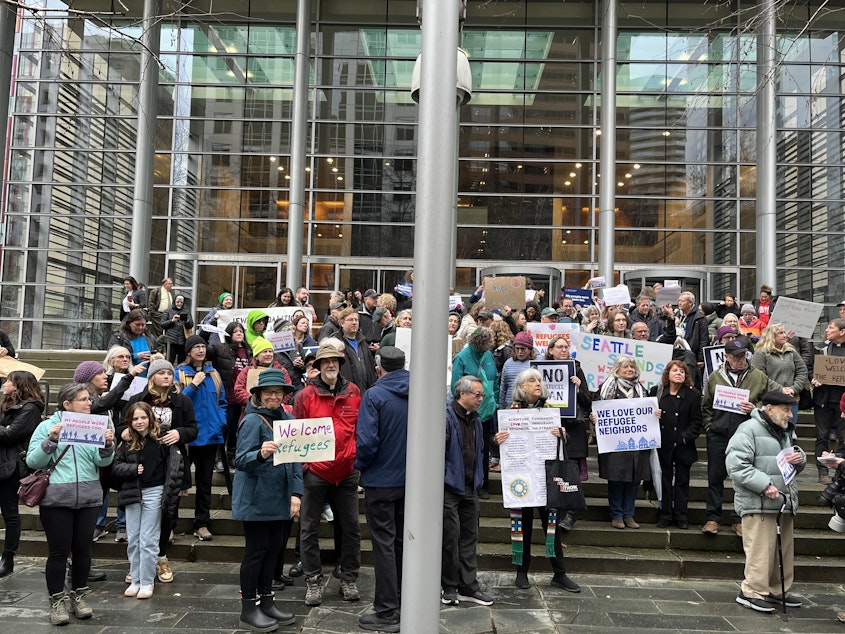What will it take to restart refugee admissions? Seattle judge presses Trump's DOJ for details

In a hearing Wednesday, a federal judge in Seattle said he's seeking a timeline for the Trump administration to "turn back on" the system of refugee admissions for those already approved to travel to the U.S. before President Trump's order suspending the program.
U.S. District Judge Jamal Whitehead indicated his upcoming order could include concrete steps to gauge the government's compliance, after refugee resettlement organizations accused the government of "open defiance" of the court's earlier rulings.
Refugee resettlement organizations said the administration has not resumed processing for refugees with conditional approval to enter the U.S. before President Trump took office, despite court orders to do so. At the same time, they say the Trump administration has directed refugee assistance with record speed to white Afrikaners in Pretoria, South Africa.
The Trump administration maintained that a recent appeals court ruling did not require them "to take steps to facilitate the entry" of those refugees with conditional approval to enter the U.S..
Whitehead did not issue any orders from the bench but indicated he is seeking information to address that particular group of refugees.
Sponsored
“I want to make sure there is framework by which the court can gauge compliance and hold the government accountable if necessary for non-compliance," he said.
Whitehead pressed Benjamin Mark Moss, the DOJ attorney representing the Trump administration, for details on restarting refugee processing and added that the details shouldn't be hard to obtain.
Sponsored
"We’re talking about a system that was functional as of January 19, 2025," Whitehead said. "I would think that getting the information necessary to give the court some sort of timeline for when the system frankly is going to be turned back on would be something that would be easy for the government to put together.”
Whitehead also asked whether the parties to the lawsuit could meet to determine a plan, to which Moss replied, “We’re happy to have the conversation.”
Whitehead first ordered the administration to resume processing for those refugees when he granted a preliminary injunction on Feb. 25. He ruled that Trump had exceeded his authority in abruptly suspending all refugee admissions and resettlement funding and ordered that the programs be temporarily restored.
"Where, as here, Presidential action effectively nullifies a congressionally established program, causing irreparable harm to vulnerable individuals and organizations, judicial intervention becomes necessary to preserve the separation of powers our Constitution demands," Whitehead wrote.
A subsequent ruling by the Ninth Circuit Court of Appeals narrowed Whitehead’s order by allowing the Trump administration to halt new refugee approvals while the lawsuit moves forward. But the Ninth Circuit reiterated that those refugees conditionally approved before President Trump suspended the program must still be processed.
Sponsored
At Wednesday's hearing, Moss said the government was seeking a clarification from the appeals court.
Whitehead responded, “It seems clear to me that there was a carveout for refugees who were conditionally approved."
Three nonprofits along with nine individual plaintiffs sought the latest hearing before Whitehead in their lawsuit Pacito v. Trump, filed by the International Refugee Assistance Project. They’re now asking the judge to order the restoration of the previous status quo for those refugees by a specific date, “such that their cases can be processed to completion and they can be admitted to the United States.”
That would assist their lead plaintiff Pacito, who “is a refugee from the Democratic Republic of the Congo who was approved for resettlement to the United States and scheduled to travel with his family on January 22, 2025, before their travel was abruptly canceled,” according to court filings. The International Refugee Assistance Project estimates that 22,000 refugees were booked for travel or travel-ready when Trump's order was issued.
The plaintiffs’ motion alleges that despite court orders, the Trump administration remains “as unwilling to comply with the Court’s first preliminary injunction as they were the day after it issued, and it is clear that, absent further action by the Court, they will continue to violate the injunction and Congress’s will.”
Sponsored
Meanwhile, the refugee resettlement organizations say in their court filing, "Defendants’ disregard for this Court’s and the Ninth Circuit’s orders stands in stark contrast to their actions to create from whole cloth a new, parallel refugee program for their preferred population" — in South Africa.
They say the Trump administration has "established a brand-new refugee-processing infrastructure in Pretoria, South Africa—with the specific aim of screening white Afrikaner farmers who were not previously in USRAP (and certainly not conditionally approved prior to January 20)."
The U.S. Justice Department’s response on behalf of the Trump administration said the status of refugee admissions should be considered by the appeals court rather than by the district court in Seattle. The DOJ also maintained that the government has no responsibility to reinstate the actual travel process.
Their response said that while the Ninth Circuit’s order includes a "carveout" that precludes the government from revoking conditional approval for those refugees, it “does not require the Government to take steps to facilitate the entry of such conditionally approved individuals.”
Their response said such conditional approval “is an intermediate step in a prospective refugee’s path that does not ensure entry into the country.” They also argued that the Ninth Circuit ruling allows them to cancel the funding for refugee processing in any case.
Sponsored
Trump's executive order titled "Realigning the United States Refugee Admissions Program" called the refugee admissions program "detrimental to the interests of the United States."
“The United States lacks the ability to absorb large numbers of migrants, and in particular, refugees, into its communities in a manner that does not compromise the availability of resources for Americans, that protects their safety and security, and that ensures the appropriate assimilation of refugees,” the order states.




